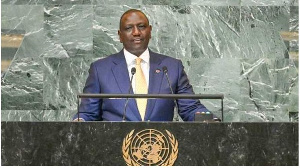Africa News of Monday, 23 October 2023
Source: theeastafrican.co.ke
Ruto Mashujaa gift to poor Kenyans: No one will be denied healthcare in new plan
President William Ruto on Friday defended his administration’s new health laws that will see Kenyans pay more from their earnings, as his government seeks to raise funds domestically to finance the Universal Health Coverage (UHC) plan.
In the new rules, the president said that no Kenyan would be turned away from any health facility, as bills would be footed by the government through the new Public Health Fund.
UHC, whose implementation has failed in the past five years – largely because of financing hurdles, lack of human resources, and high cost of medication and care – means that every person, irrespective of where they live and their socio-economic status, has access to good quality health services.
Currently, the cost of treatment depends on where patients are and whether they visit a private or public hospital.
President Ruto, who spoke during the 60th Mashujaa Day celebrations in Kericho, said every Kenyan will be provided with a special social insurance fund card that they will present for treatment whenever they visit health facilities. The poor will be covered by the government.
Dr Ruto defended the increased tax burden that comes with the rollout of UHC, saying that every Kenyan will pay according to their income.
“Previously, an individual earning Ksh10,000 ($67.7) had to part with Ksh500 ($3.39) to NHIF (National Health Insurance Fund), a hefty five percent of their earnings. On the other hand, those with salaries of Ksh100,000 ($677) or more contributed Ksh1,700 ($11.51), a mere 1.7 percent of their income,” the head of state said.
“The Social Health Insurance Fund signifies a shift to increased use of domestic resources for health financing and a sustainable approach, especially at a time when resources from donors and development partners are dwindling.”
If the government implements the proposed levy of 2.7 percent on gross earnings, it means most workers will have to part with more money.
Previous UHC financing models borrowed heavily from the inefficient NHIF, locking millions of Kenyans out of the project.
The rollout failure was also attributed to lack of medication from the Kenya Medical Supplies Authority (Kemsa), Kemsa’s monopoly, high prices of commodities, and poor turnaround time of orders.
On Thursday, President Ruto signed the Universal Health Care Bills, which are set to support the improvement of the Universal Health Coverage plan.
Focus on prevention
The enactment of the law now means there will be greater shift in Kenya’s healthcare from curative services to preventive and promotive services.
“The government’s mission is to build a progressive, responsive, and sustainable healthcare system for accelerated attainment of the highest standard of health for all Kenyans,” Ruto said.
“Recent analysis shows that, among others, the NHIF operates as a passive, rather than a strategic purchaser, is plagued by inefficiency and governance challenges, and is potentially financially unsustainable. Access to healthcare will no longer be based on the ability to pay; It will be based on the health needs of every Kenyan,” Dr Ruto said.
On emergency and chronic illness, he said every Kenyan will be treated in every hospital without any questions or need to make prior payments. The Emergency and Chronic Disease Fund will kick in when patients exhaust their mandatory social health insurance coverage. This fund also covers emergency treatment.
The Facility Improvement Financing Act will guide the counties on how to retain, manage, and use revenue generated from health-related services rendered at public health facilities.
Previously, funds allocated to public health facilities are directed to the county revenue fund and are rarely re-invested into the facilities.
President Ruto said all Kenyans will be involved in running and managing health facilities within their localities which will have a ring-fenced budget that will not be reallocated.
“You will have the mandate to address issues of lack of drugs and report to us so that Kenyans can get access to medical care near their homes. The money allocated to each facility will not be reallocated, the church leaders, development partners, civil society, residents, and administrators will be part of the management so that we deal with corruption,’’ he said.
Additionally, 100,000 community health promoters expected to transform the country’s healthcare at the grassroots will receive a stipend according to Dr Ruto in a program whose funding will be a shared responsibility by the national and 47 county governments.
Each promoter is mandated to serve at least 100 households and they have been provided with a medical kit and a smartphone to collect data.
The Community Health Promoters have been trained to provide various health services, including prenatal care, immunisation, nutrition education, and treatment of common illnesses.
“The work of the promoters will include basic preventive and promotive health, health education, basic first aid for the treatment of minor injuries and ailments at the household level, and referral for facility-based healthcare.
“The National Government is working closely with the county governments to strengthen the delivery of community health services through payment of stipends for 100,000 Community Health Promoters, on a matching basis of 50:50. The national government has allocated Ksh3 billion ($20 million) annually for payment of the stipends. It is worth noting that, as of today, over one million households in 10 counties have been visited by community health promoters, offered services, and their data captured in the 'AFYA NYUMBANI' dashboard. This is a major achievement,” Dr Ruto said.
Additionally, the Facility Improvement Financing Act addresses underfunding in public health facilities, while the Digital Health Act streamlines technology adoption to enhance data sharing and resource utilisation.
The president explained that the high out-of-pocket expenditure has for a long time denied the vulnerable access to healthcare while many have been forced to sell off assets to offset hospital bills thereby impoverishing them further.
It is estimated that healthcare puts 1.5 percent of Kenyan households below the poverty lines.
Entertainment










